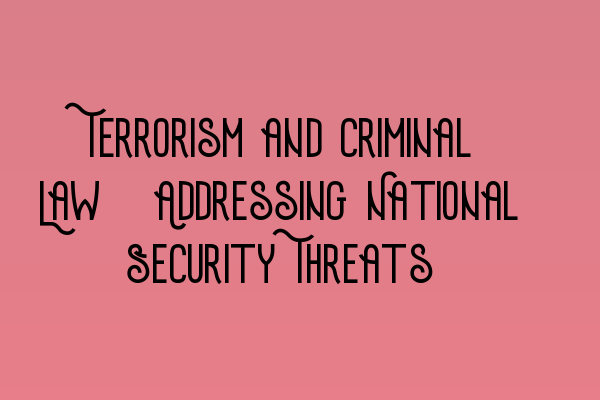Terrorism and Criminal Law: Addressing National Security Threats
In recent years, the world has witnessed a rise in terrorism and an increased focus on national security. As a result, criminal law has played a crucial role in addressing these pressing issues. This blog post delves into the intersection of terrorism and criminal law, highlighting the legal measures taken to combat national security threats effectively.
The Definition of Terrorism
Before delving into the legal aspects, it is crucial to establish a clear definition of terrorism. Terrorism can be broadly defined as the use of violence, intimidation, or coercion to incite fear and to achieve political, ideological, or religious objectives. Acts of terrorism pose a significant threat to the safety and security of individuals, communities, and nations.
Legislative Responses: Criminalizing Terrorism
Recognizing the severity of the threat, legislatures around the world have enacted laws to criminalize terrorism and provide a legal framework for combating it. In the United Kingdom, for example, the Terrorism Act 2000 was implemented to define and prosecute acts of terrorism. This legislation has been updated over the years to address emerging threats and challenges.
Alongside the Terrorism Act 2000, the Counter-Terrorism and Security Act 2015 introduced further provisions to prevent individuals from becoming involved in terrorism. These provisions include anti-radicalization measures, the prevention of radicalization in educational institutions, and the enhanced monitoring of online activities to detect and prevent potential terrorist activities.
Investigation and Prosecution
Investigation and prosecution are crucial aspects of addressing national security threats through criminal law. Law enforcement agencies and counter-terrorism units work tirelessly to gather evidence, track suspects, and bring them to justice.
The investigation process often involves surveillance, intelligence gathering, and the use of cutting-edge technology. Advanced methods such as data monitoring, forensic analysis, and cooperation with international intelligence agencies play a vital role in uncovering terrorist networks and preventing attacks.
Once sufficient evidence is gathered, prosecutions are initiated to hold individuals accountable for their actions. The criminal justice system plays a critical role in ensuring that those involved in terrorism are brought to justice and that the necessary legal measures are taken to prevent further threats.
International Cooperation
Terrorism is a global issue that requires international cooperation and coordination. Nations must work together to share intelligence, exchange information, and collaborate in investigations and prosecutions.
The United Kingdom actively participates in various international initiatives, such as INTERPOL and the Five Eyes intelligence alliance, to combat terrorism and address national security threats. These collaborations facilitate the sharing of resources, expertise, and best practices across borders, enhancing the effectiveness of counter-terrorism efforts.
The Role of Legal Professionals
Legal professionals, including solicitors, barristers, and other legal experts, play a vital role in ensuring the effective application of criminal law in terrorism cases. Their expertise and knowledge of the legal system are instrumental in upholding justice and protecting national security.
Legal professionals specializing in criminal law and terrorism work closely with law enforcement agencies, providing advice, conducting legal research, and representing clients involved in terrorism-related cases. Their commitment to upholding the principles of justice and due process is crucial in balancing the need for national security with the protection of civil liberties.
SQE Criminal Law & Practice: Becoming an Expert in Terrorism Cases
If you are passionate about criminal law and aspire to become an expert in terrorism cases, SQE Criminal Law & Practice Law UK offers comprehensive preparation courses for aspiring solicitors. These courses provide in-depth knowledge of criminal law, including the laws relating to terrorism, ensuring that you are well-equipped to handle national security threats effectively.
To enhance your preparation further, we recommend taking advantage of the SQE 1 Practice Exam Questions and SQE 1 Practice Mocks FLK1 FLK2. These resources will help you familiarize yourself with the format and content of the SQE exams, allowing you to gain confidence and perform at your best.
Stay informed about the latest developments in criminal law, including changes in legislation and SRA SQE exam dates. Our SQE 1 Preparation Courses and SQE 2 Preparation Courses provide comprehensive training, ensuring you are up to date with legal requirements and ready to excel in your career.
Terrorism is a complex and ever-evolving challenge, but with the right legal knowledge and expertise, we can address national security threats effectively. As legal professionals, it is our duty to uphold justice, protect civil liberties, and work towards a safer and more secure society.
Visit SQE Criminal Law & Practice Law UK website to embark on your journey towards becoming a skilled and knowledgeable solicitor in the field of terrorism and criminal law.
